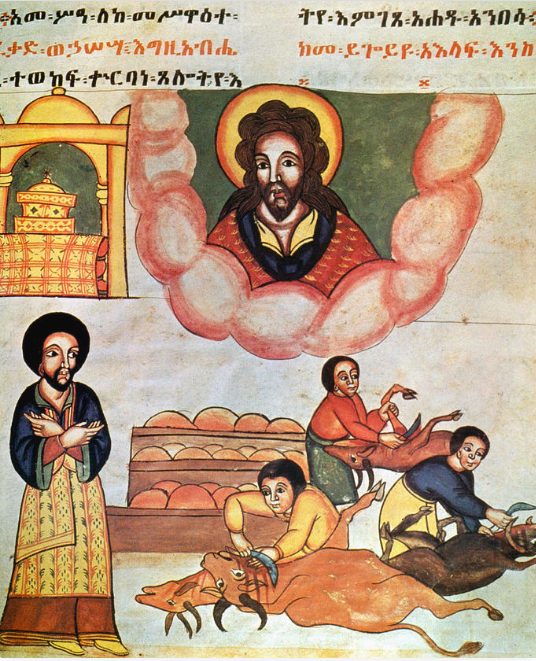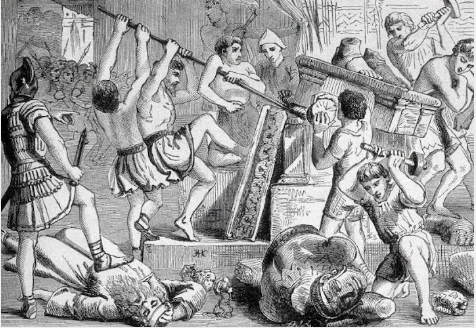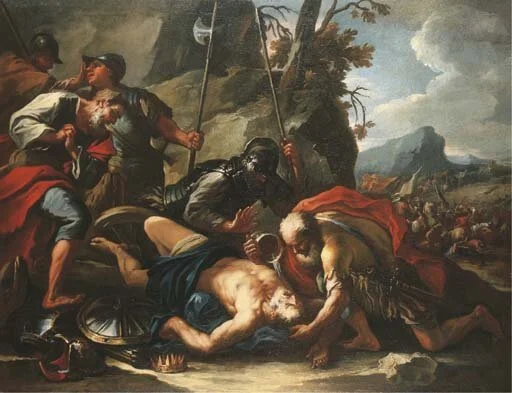Revised stories of the patriarchs proved powerful propaganda, and Deuteronomy presented the moral code of early Judaism — with a surprising amount of human rights.
The penultimate king of Judah, Josiah is held up as the best of the best. We have him to thank for the Judaism practiced today.
King Josiah receives more superlatives of awesomeness than any other figure in the Old Testament. And with heavy hitters like Moses, David and Joshua, that’s saying something.
“Before him there was no king like him, who turned to the Lord with all his heart and with all his soul and with all his might, according to all the law of Moses; nor did any like him arise after him,” gushes 2 Kings 23:25.
Not too bad for a kid who was crowned in 639 BCE at the tender age of 8, after his father, Amon, was assassinated in a coup, having reigned only a year.
King Josiah oversees a ritual sacrifice in this illustration from an Egyptian manuscript.
Of course, it turns that the early books of the Old Testament were written in the 7th century BCE, when Josiah ruled the kingdom of Judah. The writings were planned specifically to bolster his vision of a unified Israel, where everyone abandoned all other deities to worship only YHWH (aka Yahweh, or God), according to Israel Finkelstein and Neil Asher Silberman in The Bible Unearthed: Archaeology’s New Vision of Ancient Israel and the Origin of Its Sacred Texts.
The book of Law that King Josiah discovered in the Temple was, most likely, the original book of Deuteronomy. We’re not sure why this prompted him to tear his robe, though.
Finding the Book of Law
In the 18th year of Josiah’s reign, 622 BCE, the king commanded his high priest to renovate the Temple. During the work, a new book of Law turned up.
“That book, identified by most scholars as an original form of the book of Deuteronomy, sparked a revolution in ritual and a complete reformation of Israelite identity,” Finkelstein and Silberman explain. “This was the formative moment in the crystallization of the biblical tradition as we now know it.”
King Josiah has the idols of Baal destroyed (and the priests killed) in this illustration by Gustave Doré.
According to Josiah and other hardcore monotheists, there was a lot of work to be done (and undone).
The new book of Law “suddenly and shockingly revealed that the traditional practice of the cult of YHWH in Judah had been wrong,” the authors continue.
Pagan practices were taking place even within the confines of the Temple itself. Josiah had all the iconography of Baal removed, along with anything used to worship the sun, moon and stars, and had it all burned. He also broke down the houses of the male cult prostitutes (!!!).
That was just the beginning. Josiah marched northward, smashing stone altars to other gods and killing their priests.
The frontispiece to the book of Deuteronomy in the Nuremberg Bible
A Revolution in Human Rights
The new Law wasn’t all just destruction and death, though.
Josiah made Passover an official holy day, which linked him with Moses, who was involved in the holiday’s gruesome origin.
More than this, “Deuteronomy calls for the protection of the individual, for the defense of what we would call today human rights and human dignity,” write Finkelstein and Silberman. “Its laws offer an unprecedented concern for the weak and helpless.”
For example, Deuteronomy 15:7-8 states, “If there is among you a poor man … you shall open your hand to him, and lend him sufficient for his need, whatever it may be.” Imagine if that were still in practice today.
Joseph’s awful brothers sold him into slavery. He was born too soon — thanks to the book of Deuteronomy, his servitude would only have lasted six years.
In addition, Josiah’s law gave inheritance rights to wives, instructed farmers to give tithes to the poor every third year, protected resident aliens from discrimination and freed slaves after six years of servitude.
The Death of King Josiah by Francesco Conti, who lived 1681-1760
Josiah’s Lasting Legacy
Was Josiah successful in his campaign of religious centralization? Perhaps not on as broad a scale as he would have liked. Evidence suggests that he “failed to stop the veneration of graven images, since figurines of a standing woman supporting her breast with her hands (generally identified with the goddess Asherah) have been found in abundance within private dwelling compounds at all major late-seventh century sites in Judah,” explain Finkelstein and Silberman.
One god just wasn’t enough for the ancient Judahites — many a household had figurines of the goddess Asherah like this one.
In 610 BCE, the new pharaoh, Necho II, launched a military expedition, allying with Egypt’s old foes the Assyrians to battle an even greater threat: the Babylonian Empire.
No one is quite sure why Josiah joined the fray against Egypt. Whatever the reason, it was a decision that led to his death. 2 Kings 23:29 glosses over the loss of the greatest king of Judah as if the writer were embarrassed: “In his days Pharaoh Necho king of Egypt went up to the king of Assyria to the river Euphrates. King Josiah went to meet him; and Pharaoh Necho slew him at Megiddo, when he saw him.”
Pharaoh Necho II, who killed King Josiah. The Old Testament glosses over this event, as if the writers were embarrassed and wanted to downplay it.
“In his days Pharaoh Necho king of Egypt went up to the king of Assyria to the river Euphrates. King Josiah went to meet him; and Pharaoh Necho slew him at Megiddo, when he saw him.” (2 Kings 23:29)
“One thing is clear. The Deuteronomistic historian, who saw Josiah as a divinely anointed messiah destined to redeem Judah and lead it to glory was clearly at a loss to explain how such a historical catastrophe could occur and left only a curt, enigmatic reference to Josiah’s death,” write Finkelstein and Silberman. “Decades of spiritual revival and visionary hopes seemingly collapsed overnight. Josiah was dead and the people of Israel were again enslaved by Egypt.”
By 597 BCE, all the cities of Judah had been crushed under the Babylonian assault, culminating with the defeat of Jerusalem, which was burned to the ground. The Babylonian ruler, Nebuchadnezzar, looted the Temple and deported all but the poorest inhabitants of Judah.
The Babylonians, led by King Nebuchadnezzar, defeated Judah, enslaved its people and burned Jerusalem to the ground.
Judah’s last king, Zedekiah, was captured. He had to watch the Babylonians slaughter his sons before he was blinded.
Zedekiah, the last king of Judah, didn’t fare so well. Tragedy of Zedekiah by Charles Monnet, 1750
Nebuchadnezzar had Zedekiah blinded — only after the king of Judah had watched his sons get slaughtered.
Nevertheless, there was a power in Josiah’s movement. His revisionist history and rallying cry have become parts of the most popular book on the planet. And the laws of Deuteronomy found within “served as the foundation for a universal social code and system of community values that endure — even today,” write Finkelstein and Silberman. –Wally










































